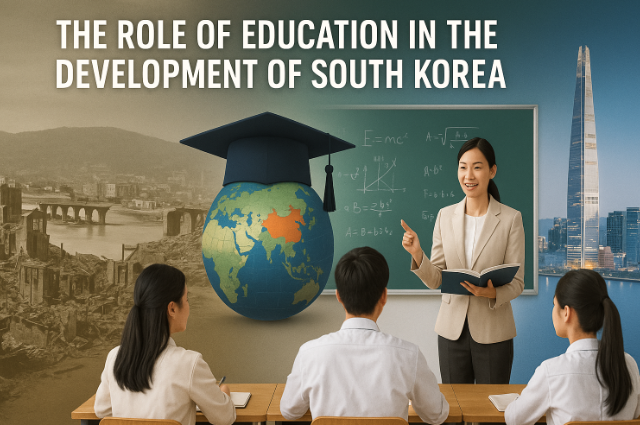
The journey of South Korea from one of the poorest countries to one of the most technologically advanced and economically successful countries in the world is astounding as well as marvelous. This remarkable transformation is often referred to as the “Miracle on the Han River,” and the foundation of this miracle is a single, powerful force — Education.
Let’s Peek into the History a Little Bit
After the famous Korean War, which occurred from 1950 to 1953, South Korea struggled with limited resources and infrastructure to deal with widespread poverty. Korean leaders took the bold move of turning human capital into their most valuable asset. The government recognized that only the people of the country could rebuild the nation, so they started investing in building schools, providing training to teachers, and expanding the circumference of literacy.
The transformation of society started with the belief in education, the powerful tool that can shape the future of a nation.
Government’s Education Policies
The then-government of South Korea was quite sensible about setting clear goals, revising educational policies, and providing funding. The government played an active role in mass education.
The government has been reforming and revising educational policies from time to time.
To promote primary education among the masses, the government in the 1960s and 1970s implemented policies to promote universal primary education. It was in the 1980s that the government shifted focus from primary education to secondary and higher secondary education, with the main target being the youth so they could learn and adapt to more advanced skills and prepare themselves for their desired professions.
The government also emphasized revising and modernizing the curriculum, providing and arranging vocational training for teachers to give a strong foundation and make the teaching process easy and effective.
One of the best parts about the South Korean Ministry of Education is that they have aligned their educational policies with their national economic plans, ensuring that the workforce receives the right and required skills, which align with changing industrialization.
Involvement of Society and Cultural Attitudes Towards Education
In Korean society, pursuing education has always been seen as a symbol of social status, respecting knowledge and the knowledgeable, following Confucian values, achieving academic titles and positions, and valuing hard work. These cultural values have influenced Korean society for centuries.
Success in education is considered an honor for the entire family, which is why most families invest heavily in their children’s education. They send their children to private institutions or academies known as “hagwon” in Korean, even if it costs them a fortune. Some families even take loans to pay the fees of these private institutions.
These practices have created immense competition among students, and they are always in the race to secure seats in South Korea’s topmost universities like Seoul National University, Korea University, and Yonsei University, famously known as the “SKY” universities.
Industrial and Economic Development with a Skilled Workforce
South Korea has made amazing progress in fields like automobiles, telecommunications, AI-powered robotics, and the electronics industry. This was possible because of the skilled and adaptive workforce, which matched the demands of the changing global economy.
South Korean giants like LG, Samsung, and Hyundai hire highly skilled and talented individuals. Managers and directors are recruited with knowledge of global business and are often educated in related fields. Engineers are trained in advanced STEM fields, which refers to a high level of expertise in Science, Technology, Engineering, and Mathematics, and are equipped with cutting-edge knowledge and research capabilities.
South Korea believes in smart labor, not cheap labor. The nation’s quality education is directly proportional to innovation, growth, and productivity. That is the reason South Korea ranks among the top knowledge-based economies in the world.
Using Higher Education as a Global Gateway
The South Korean government provides scholarships to thousands of foreign students under the project “Study Korea,” which indirectly increases the soft power of South Korea. Along with Korean universities, they have launched international programs in diverse fields, attracting students from across the globe — not only because of educational programs but also due to the influence of the Korean Wave (Hallyu), which has spread through K-dramas, K-beauty, K-movies, and the Korean language.
Apart from education, South Korea focuses on mental health support, providing lifelong learning programs, promoting creative and analytical thinking, and funding science, technology, and research development.
The South Korean education system is also well known for high academic performance, strong parental involvement, strict discipline, and an effective work model.
South Korea has proven that education is not just a tool but a strategic foundation for building a nation that is both economically and culturally strong.
South Korea celebrates its National Liberation Day on August 15. It gained its independence in 1948. In less than a century, South Korea has gone from zero to hero. Using education as a foundation, South Korea has aligned it with the nation’s economic policies, traditions, and cultural values to lead on a global level.
While many countries are still searching for natural or physical resources to make their growth sustainable, South Korea has shown that human capital is the true resource. With proper education, human capital can become a nation's greatest business and academic asset.
The world is experiencing South Korea’s growing influence, and many developing countries can take a valuable lesson from South Korea — that investing in human capital through education can yield the highest returns and change the fate of a nation forever.
